Symposium
AY 2009 Early Completion Program Symposium (Report)
Course Guidance System for the Early Completion Program and Social Needs
On March 11, 2010, the first “Early Completion Program Symposium” was held. In this symposium, we introduced the circumstances under which we launched the Early Completion Program as a unique initiative of the University of Tsukuba, recognizing the necessity for working people to obtain a doctoral degree. In addition, we discussed the system to guarantee the quality of the doctoral degree in order to make the achievement evaluation and external evaluation, etc. ideal.
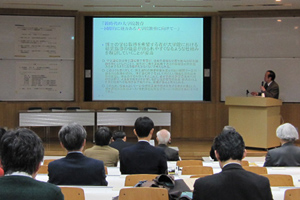
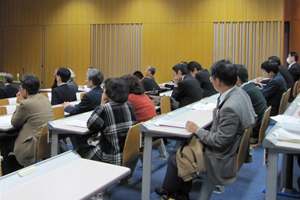
Venue
Open Lecture Room 110, 1F Laboratory of Advanced Research Building A, University of Tsukuba
Date and Time
March 11, 2010 (Thursday) 14:00-16:30
Outline
- MC
OHTA Yuichi (Vice Chair of the Early Completion Program Steering Committee, University of Tsukuba) - Greeting
SHIMIZU Kazuhiko (Vice President and Exective Director for Education, University of Tsukuba) - Invited Lecture “The Social Demand for Early Acquisition of a Doctoral Degree”
MATSUZAWA Kazuya (Corporate Research & Development Center, Toshiba Corporation) - Lecture “Course Guidance System”
MIYAMOTO Sadaaki (Professor, Graduate School of Systems and Information Engineering, University of Tsukuba) - Report “Course Guidance Report”
MURAKAMI Masahide (Professor, Graduate School of Systems and Information Engineering, University of Tsukuba) - Invited Lecture “External Evaluation of the Early Completion Program”
TAKEUCHI Shin (Honorary Advisor, Tokyo University of Science) - Panel Discussion
- TAKEUCHI Shin (Honorary Advisor, Tokyo University of Science)
- YANO Tomosaburo (Industrial Science and Technology Policy and Environment Bureau, Ministry of Economy, Trade and Industry)
- ARAI Kazuo (National Institute of Advanced Industrial Science and Technology)
- OSAWA Yoshiaki (Professor, Graduate School of Systems Information Engineering, University of Tsukuba)
- MIYAMOTO Sadaaki (Professor, Graduate School of Systems and Information Engineering, University of Tsukuba)
- MURAKAMI Masahide (Professor, Graduate School of Systems and Information Engineering, University of Tsukuba)
- Coordinator: KITA Eiji (Executive Director for Operations of the Early Completion Program, University of Tsukuba)
- Discussion Organizer
MURAKAMI Kouichi (Chair of the Early Completion Program Steering Committee, University of Tsukuba)
Symposium Contents
Aims and Objectives
In this symposium, we will introduce the circumstances that led to the launch of the Early Completion Program as the University of Tsukuba’s own initiative to the latent needs of working people for a doctoral degree. The symposium will serve as a forum for discussion on the further enhancement of the course guidance system and its operation, including an achievement assessment to guarantee the quality of the doctoral degree and external evaluation to monitor the system. The purpose is to widely disseminate the usefulness of the Early Completion Program.
Invited Lecture: Mr. MATSUZAWA Kazuya, Corporate Research and Development Center, Toshiba Corporation
“The Social Demand for Early Acquisition of a Doctoral Degree”
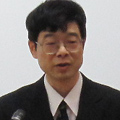
“The Necessity of a Doctoral Degree from the Company’s Perspective” was the theme of his lecture, which covered the changes in response to doctoral degree recipients from overseas, career advancement as a researcher, and the direction of the program. He stated that he sees this program as a bridge between companies and doctoral degree holders.
Lecture: MIYAMOTO Sadaaki, Professor, Graduate School of Systems and Information Engineering, University of Tsukuba
” Course Guidance System “
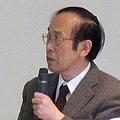
The theme was the “Concrete Explanation of Course Guidance System.” In order to ensure the quality of the doctoral degree, which is the most important issue for the Early Completion Program, he stated that the achievement evaluation system and external evaluation system are introduced to verify whether the process is being carried out properly. At the same time, he explained the difference from a doctoral degree by thesis only.
Report: MURAKAMI Masahide, Professor, Graduate School of Systems and Information Engineering, University of Tsukuba
“Course Guidance Report”
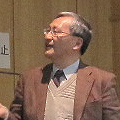
He reported on the specific course guidance methods and his impressions in actually guiding the students of the Early Completion Program. He expressed his opinion that this program may have dispelled some concerns about the transparency of the doctoral dissertation.
Invited Lecture: TAKEUCHI Shin, Honorary Advisor, Tokyo University of Science (Incumbent: Director of the Museum of Science, Tokyo University of Science)
“External Evaluation of the Early Completion Program”
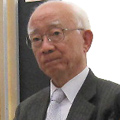
“The Role of the External Evaluation System” was the theme of his lecture, in which he explained the purpose of the external evaluation system and its specific management methods. He also discussed the features and advantages of the Early Completion Program from an external perspective.
Panel Discussion
Report: OSAWA Yoshiaki, Professor, Graduate School of Systems and Information Engineering, University of Tsukuba
“Ministry of Education, Culture, Sports, Science and Technology (MEXT) 2006-2007 Leading University Reform Promotion Consignment Project: Research and Study on Issues Related to the Establishment of a Short-Term Doctoral Course”
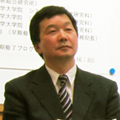
Prior to the panel discussion, there was a report on the early acquisition of the doctoral degree from this research study, a project related to the Early Completion Program. Social research and data analysis, revitalization of overseas exchanges, and the movement from upward mobility to career advancement.
Discussion
Six panelists from within and outside the university were invited to make the following recommendations and discussions.
- How do we distinguish between the “society’s needs for the early acquisition of a doctoral degree” and “individual needs”?
- The development of high-level human resources is important both for companies and for improving the level of research at universities.
- The background to the creation of the achievement assessment is that “it is important to ensure that individual problems are improved.”
- It is important to ensure that the same level of achievement is achieved by students in regular doctoral programs (three-year doctoral programs) and students in the Early Completion Program. It is necessary to consider the quality assurance of the degree, including those of regular doctoral programs.
Photo
-
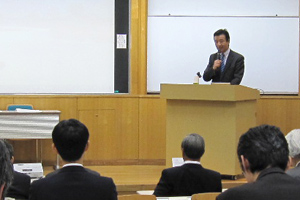
Vice President Shimizu delivers the opening address
-
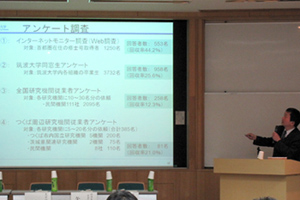
Research report by Professor Osawa
-
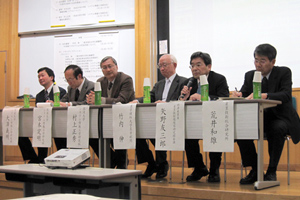
Panel discussion
-
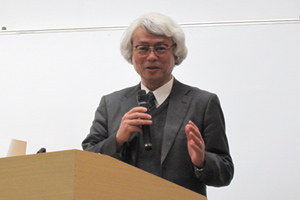
Summary by Professor Murakami K.
